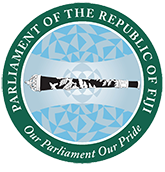Standing Orders are the rules of procedure for Parliament and its committees. Section 71 of the 2013 Constitution of the Republic of Fiji gives Parliament the power to make Standing Orders and rules for the order and conduct of business and proceedings in Parliament and its committees and for the way in which its powers, privileges and immunities may be exercised and upheld.
Fiji’s 2013 Constitution was promulgated on 6 September 2013 and came into force on 7 September 2013. On 17 September 2014, Fiji had its general election to elect the fifty (50) Members of Parliament.
On the 3rd day of October 2014, His Excellency issued a proclamation summoning the Parliament to meet on Monday, the 6th day of October 2014 at 10.00am.
On 6 October 2014, the Parliament sat for the first time and pursuant to section 71(2) of the Constitution, the Standing Orders of Parliament as gazetted was adopted by Parliament. Pursuant to Standing Order 128(2), the Standing Orders Committee was convened to review the Standing Orders and report to Parliament within 14 sitting days with recommended amendments – this was done on 1 December 2014.
The following table provides an overview of the history of the Parliament’s Standing Orders beginning from the 1st Term of Parliament, under the 2013 Constitution, and through the subsequent terms.
</tr



